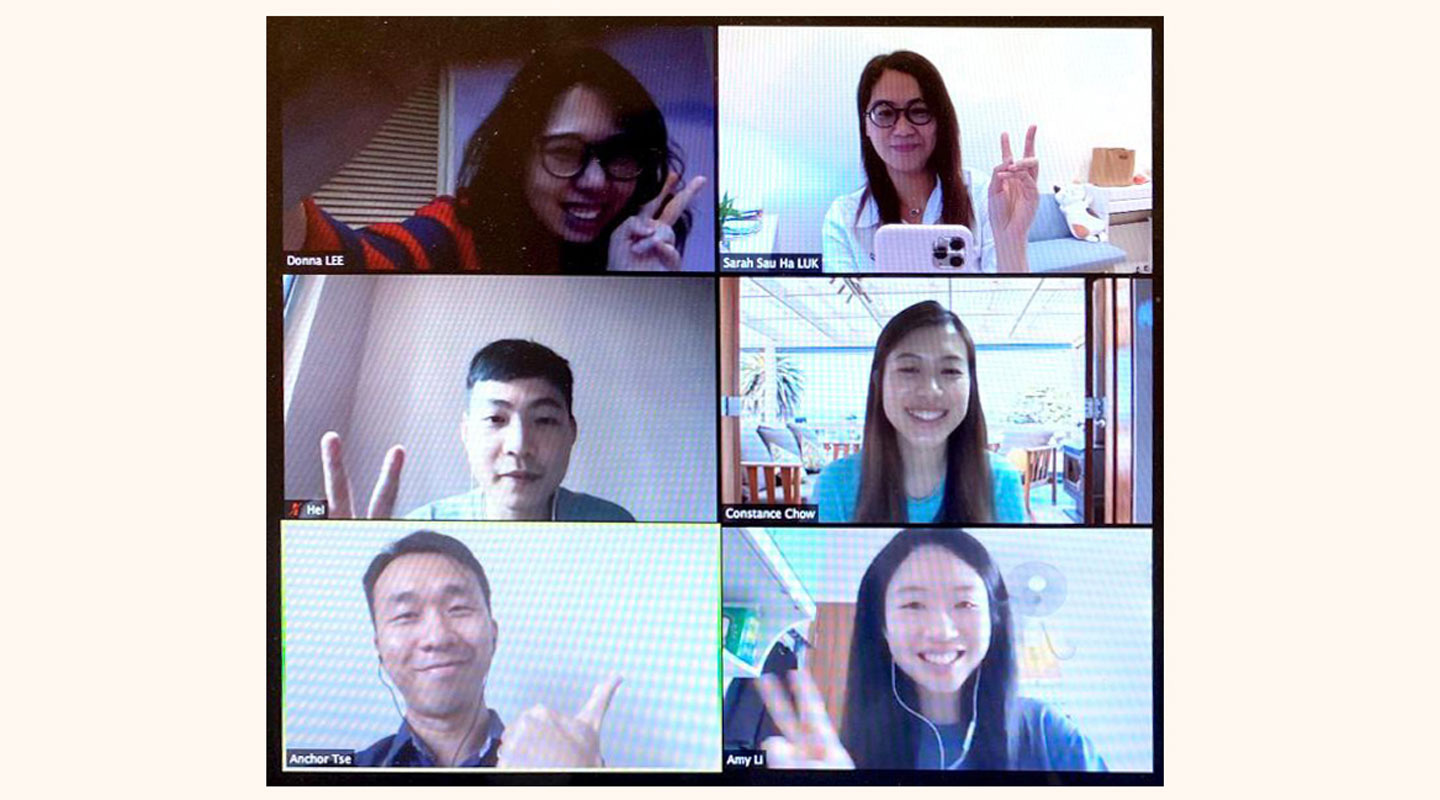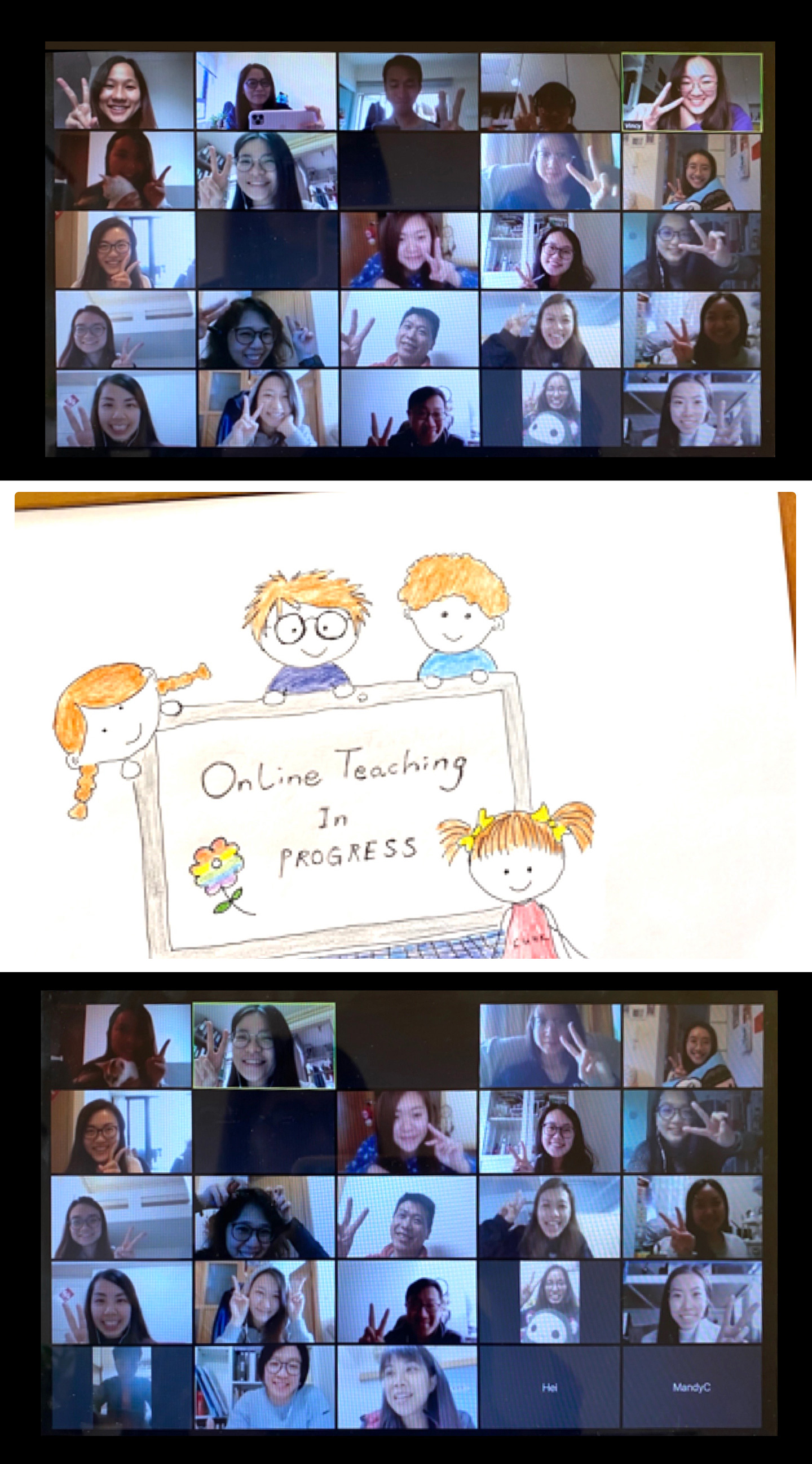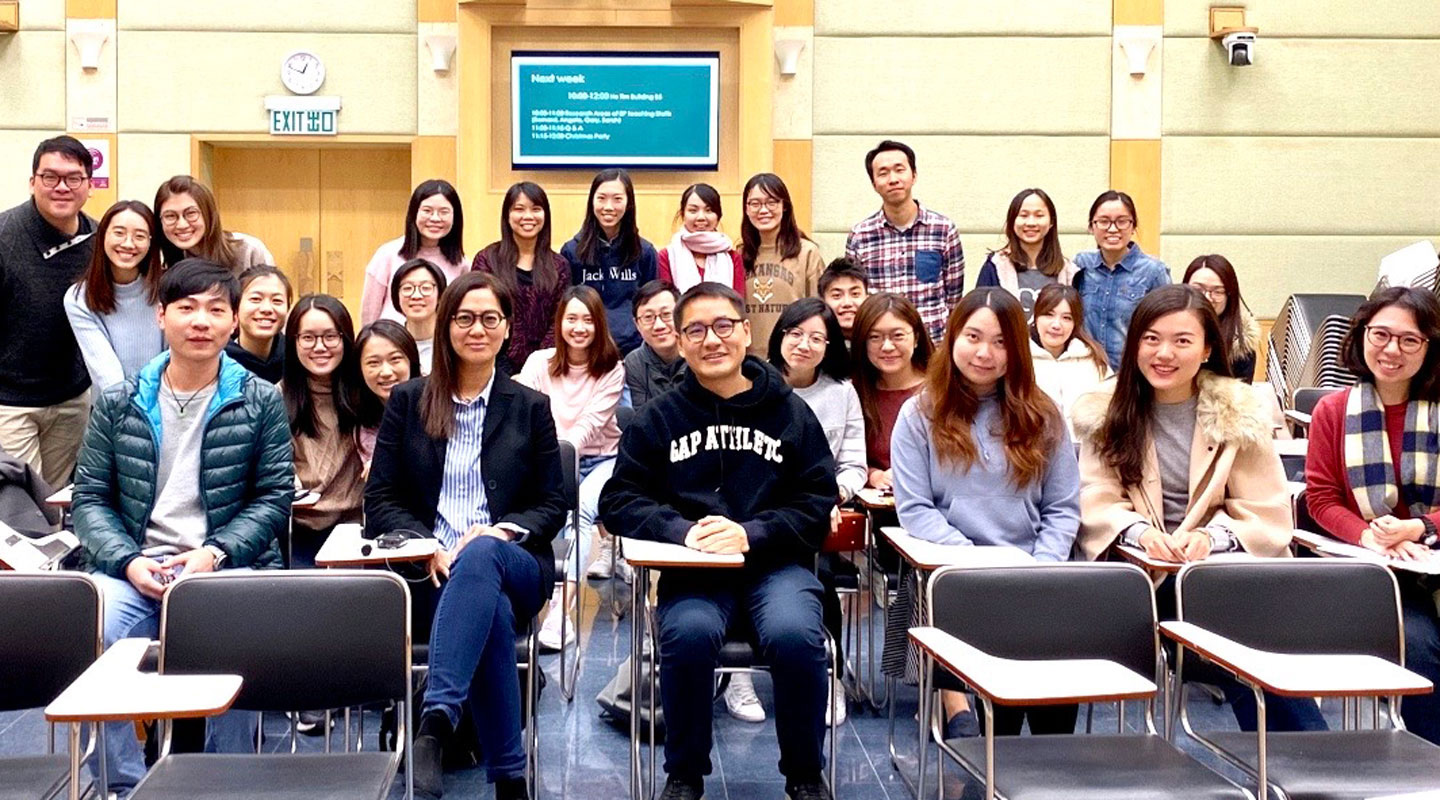Dear readers, With the launch of e-newsletter CUHK in Focus, CUHKUPDates has retired and this site will no longer be updated. To stay abreast of the University’s latest news, please go to https://focus.cuhk.edu.hk. Thank you.
Moontide that Ne’er Ebbs
Educational psychology and its torch bearers

That was the last day of her practicum, after which, providing there was no mishap, she would be a registered educational psychologist. Her final task was to conduct a final assessment for an intellectually disabled student she had followed up on before his turning 18. The assessment report would be referred to by the Social Welfare Department in deciding his next stop. The task was demanding, as her subject could not express himself in words, but in the end what should be done was done. No sooner was the evaluation completed, her supervisor—a 50-year-old veteran psychologist from the Education Bureau—asked her to come to his room. At the door, she kept shuddering: did I do something wrong? Will I be trashed? Can I pass?
In the room, he bade her to take a seat and, taking out a broken, rusty red button badge, calmly remarked, ‘My supervisor gave this to me 30 years ago when I graduated. Now I pass it on to you. Hope you can be a good educational psychologist…’
On a drizzling March morning, educational psychologist Sarah Luk divulged to me her dream over the phone. She choked up as she spoke about her wish to train psychologists, and was unable to go on when touching upon what her supervisor had expected of her. Calming down, she said, ‘The button badge means passing on. It’s a responsibility; this cohort has impeccable academic track record, and the onus is on me to make them from good to great. Will a lot of people suffer if I fall short of it?’
Sarah’s dream to nurture psychologists was consummated last year. Through years of preparation and with support of the government, the University Grants Committee and the University, the master’s programme in Professional Educational Psychology was launched this academic year, making it the third programme in Hong Kong—the other two being offered by The University of Hong Kong and The Hong Kong Polytechnic University—devoted to training qualified educational psychologists. After two years’ full-time study, students satisfying all requirements will become registered educational psychologists, helping children and teenagers, as well as teachers and parents cope with issues in education.
‘Education’ and ‘psychology’ are self-explanatory, whereas educational psychology, yet to enter the popular lexicon, will likely cause confusion. Actually, the essence of this discipline lies in deploying the research outcomes and insights in psychology to facilitate the learning and personal growth of children afflicted by emotional, behavioural and social problems. Children with autism, dyslexia, attention deficit hyperactivity disorder and giftedness are their most common clients, but educational psychologists are ultimately guardians of children and adolescents, ensuring their rights to life and learning and facilitating their developments. An emphasis on assessment is what distinguishes educational psychology from its siblings, like counselling psychology. Educational psychologists work with principals, teachers and parents, and at the same time, they must also stand apart to understand how the plights of their subjects are precipitated institutionally. What they do, after the reckoning, is to signal the way out and walk it with their clients.
Since 2008, the government has dispatched educational psychologists to primary and high schools, and the Policy Address has for many years emphasized the need to improve the ratio of psychologists to schools. With the number of primary and high schoolers topping 700,000 and 880,000 throwing in the kindergarteners, and 67,000 students with special educational needs (SEN), the count of 300 educational psychologists in the city sounds meagre and has certainly a long way to go to catch up. The training at CUHK is packed: the two-year curriculum covers the code of ethics, assessment, counselling, interventions and research methods, complete with graduation thesis and practicum. They have to be versatile with matters of the heart and the institution, and be able to tap inspirations from literatures to enhance their counselling. Through two rounds of interview, the interviewing panel of the programme picked 30 apprentices as their first cohort, who they believe possess both sterling character and calibre. To join the training, many let go of their established careers, getting back to school and trying to live up to the exacting demands of a professional programme. Experiencing social unrest and the coronavirus pandemic, the switch from face-to-face to online teaching and the deferring of practicum, this first class of educational psychologists at CUHK has an early taste of human vicissitudes and the unpredictable in life. How do they feel, and how do they cope?
As arranged by Sarah, I spoke with four educational psychologists-in-training Constance Chow, Issac Lai, Donna Lee and Anchor Tse on their reasons for joining the programme, things they gave up, what professionalism entails—and the meaning of serendipity.

Labour of Love
‘Eight months into the programme, do you get used to its rhythm?’
‘Things were all right in the beginning, September and October were honeymoons. Then a deluge of case studies and assignments rushed in. But I bet leading a busy life is part of being a professional—being hectic is completely normal, there’re so many topics to explore,’ said Constance. Leaving the school just two years ago, she is the youngest in class and was an applied behavioural analysis therapist, treating children with autism spectrum disorder. She found out how fond she was of such children in her undergraduate days: ‘Their traits and intelligence are all different, so are the behaviours of male and female. Though being labelled ill, they are actually very cute. I had ardently wished to get into the programme, and I am hoping to serve other kids as well.’
Having taught liberal studies in high school for eight years, Anchor was fascinated when he came upon this new programme. Taking a leap of faith into a role both strange and familiar, he is hoping to carve for himself a lifelong career. ‘In the early days of teaching, I have felt that the local school culture does not sit well with me. Most schools in Hong Kong are exam-oriented. You have to rush through the curriculum, drill for exams, which was not what I desired to do when entering the trade. I love discussing with students their family or even romantic issues, but teachers are really too busy and are caught in an eternal dilemma: should I talk with students individually on their personal issues, or should I go back to my seat to mark the piles and write reports?’ He continued, ‘I am more of an independent sort. On many matters, teachers have to follow the collective agenda, but at times I wish to do things in my own way.’
Caught in Hamlet-like indecision for years, Anchor didn’t miss it this time. Though what tugs at his heart is his three-year-old daughter. The little girl loves sticking with her father, and the choice between study and accompanying his daughter transpires into a constant tug of war, particularly during this time when she stays at home. ‘Sometimes I feel I am making this career switch at the expense of her education. There is a nagging sense of guilt.’ Any remedies? ‘If time allows, I would be by her side, and start studying only when she falls asleep,’ he laughed, ‘I do not need to sleep a lot. Hopefully by shortchanging sleep, I can get through these two years.’
Also changing tack is Donna, an occupational therapist working in the field for more than a decade. She was acquainted with psychology at work and the rest is history: ‘As an occupational therapist, I could only help my clients up to certain points. I was intrigued by topics like family, counselling and cognitive processes, on which the educational psychologists I met at work kept enlightening me. I was hooked.’

Everyone is an invisible presence the moment he or she is thrown into this world. It is the circumstances and our reactions to them that shape us, make us see ourselves and give us an idea on what kind of life we’d love living. Issac, also the class representative, took up a slew of part-time jobs during the university days, out of which helping children with special needs was particularly satisfying. ‘The feeling is beyond words. But it’s what I want to do in my heart of hearts.’ Two to three years after graduation, he applied himself to assessing and counselling SEN students. Educational psychology is notoriously difficult to get in due to the scarcity of places, and Issac understands the overlap between career and vocation is not something granted. Psyched up for the possibility where he may serve the SEN group in other capacities, he made it and is among the first crop of educational psychologists trained by CUHK.
Having to deal with complex conditions like autism and dyslexia, the educational psychology programme is demanding both in breadth and depth. Anchor told me the pressure, rather than coming from their teachers, is generated by the realization of the significance of the work and their self-expectations. ‘After graduation, different folks at school may want to hear your professional opinion, so you need to know a lot. The learning atmosphere is another source of pressure. A lot of us impose high demands on ourselves and are perfectionists. There are always peer comparisons, so there’s no excuse to slack.’ Given the long stretch of days ahead, he remarked, it’s essential to maintain work-life balance and find time to nourish oneself. ‘I admire Sarah—she’s so busy yet still manages to cultivate her own interests, playing cello, strumming the guitar, etc.’
Tough as it is, the programme handed out unexpected rewards: after a training session, the class took a school bus arranged by the class representative for a school visit. The intimacy between classmates transported one back to school days; for a lesson on play therapy, the teacher asked the class to bring toys back to play. From initial embarrassment to thorough enjoyment, the classmates’ carefree demeanour contrasted with their customary seriousness. A casual question from the teacher happened to touch the heart, and honest sharing was met with actual help, begetting an openness as never before. In a visit to a school of social development, following the social worker through the premise, one learnt about the disciplinary drills there and imagined what life’s like for these non-mainstream students.
Returning with a Boat of Moonlight
Before the interview, Sarah sent in the self-introductions penned by her 30 students. The ‘scientist-practitioner’ characterization recurs throughout and leaves a deep impression: the educational psychology training does not just emphasize practice, but also science and research which work to forge the professional credibility and confidence of an educational psychologist. ‘It impresses me that educational psychologists have a strong professional compass. When facing the public, they offer counsel in keeping with the professional guidelines,’ noted Donna. On the other side of the delicate balance weighs in practice. To Anchor, the term 'scientist practitioner' means the following: ‘On the one hand, as a scientist, your handling has to be informed by theory and based on evidence, ensuring it’s staying abreast of the latest academic development. On the other hand, you cannot stay in the ivory tower but have to be down-to-earth, sympathizing with flesh-and-blood humans.’ Educational psychology has a lofty positioning, but Issac conceded that in the institutional fabric, principals, teachers and parents have their own thoughts, and it isn’t always easy to work one’s way through.
To this, Sarah, who had been listening all along, asserted, ‘When the system slacks off, it is time we educational psychologists took arms against it. Your sharing reminded me of the courage I had in pursuing the study in the past, and indeed you have given up a lot to get into this programme. The most important bit, however, is whether you’ll have the courage to speak up when you spot something wrong with the system, as your professionalism calls for.’

‘The courage is something you already possess,’ affirmed the veteran psychologist. ‘Getting into the programme, you may have a lot of expectations, want to take home a lot of things. But when you leave, I hope you will find that not enough and hunger for more.’ Towards the end, Sarah mentioned the last line of a Zen poem composed by a monk in the Tang Dynasty: ‘ “The boat returns / devoid of fish catches, / yet laden with shimmering moonlight”—how interesting. The line sounds it’s all for naught, but quite the opposite it’s naught for all. The moonlight is precisely what Issac said about the mindset of an educational psychologist. We don’t know what’s in store for us, when we will get back to school, how SEN students fare at home, etc. Chaos may await us. We can only approach our duty with humility.’
‘Just now you said you have a lot of challenges on the plate. But my colleagues and I are under as much stress being in charge of a class of educational psychologists. Training educational psychologists has long been my wish. The chance to do so is a beautiful serendipity,’ continued Sarah, with tears shimmering in her eyes—
‘What is serendipity? It is that in your fleeting life, you figure out what you want you do and stand a chance of doing it. Having you all as my students is a godsend. Why do I keep going even after getting to the bottom of things? It is because I want to pass on all I know to you.
‘We seem to be walking on two tracks, but we are heading to the same direction.’
Amy L.